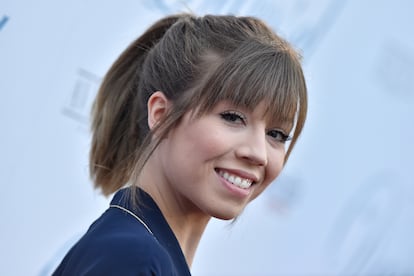‘She taught me an eating disorder when I was eleven years old’: Jennette McCurdy, the actress who lost her childhood to her mother and Nickelodeon
The actress accepted her first television role at just eight. In her biography ‘I’m Glad My Mom Died,’ she describes years of abuse while the world saw her as a successful teen

At eight years old, Jennette McCurdy accepted her first role as an actress in the series MADtv (2000). She didn’t want to become an actress, but her mother, Debra McCurdy, had already prepared a film career for her. For the next decade, the young actress faced constant psychological abuse from her mother, until Debra’s death by cancer in 2013. After that, everything changed. In August 2022, Jennette McCurdy published her biography, I’m Glad My Mom Died. In its pages, she reveals everything she had held back until now, though she had already hinted at the content in a theater production, from episodes of anorexia and anxiety to abuse from “The Creator,” as she refers to someone from the industry who she does not cite by name.
With six mouths to feed —Jennette was one of four siblings— the McCurdy family had just enough money to pay their bills. Jennette adored her mother: the little girl did whatever she could to keep Debra happy. “I think you should act. I think you would be a great little actress. Blonde. Blue-eyed. You’re what they love in that town,” she told her six-year-old daughter. That’s where the long, difficult path, through television sets and interminable auditions, began. First came small roles as secondary characters, but little by little she found more success at castings. She recalls how she normalized her mother’s behavior, to the point of drinking energy drinks at just eight years old: “My mouth is dry the way it always is before auditions, and I have to pee even though I already peed four times. I think it’s the sugar-free Red Bulls Mom has me drink before comedy auditions because she says I just don’t have comedy energy otherwise.”
In addition to manipulating her daughter for years to fulfill her wishes, McCurdy’s mother, the actress recounts, also used her cancer for personal gain. “Mom loves recounting her cancer story —the chemotherapy, the radiation, the bone marrow transplant, the mastectomy, the breast implant, the stage fourness of it, how she was only thirty-five when she got it— to any churchgoer, neighbor, or fellow Albertsons customer who lends her a listening ear. Even though the facts of it are so sad, I can tell that the story itself gives Mom a deep sense of pride. Of purpose,” she writes.
At 11 years old, an innocent question changed her life forever: “What can I do to stop the boobies from coming?” Her mother didn’t doubt her reply for a second. “Well, sweetheart, if you really want to know how to stay small, there’s this secret thing you can do... it’s called calorie restriction.” There began her obsession with weight loss, calorie-counting and medications to postpone her growth, a behavior that today, at 30 years old, continues dominating her life. “I notice that most foods add a little body weight to me, four-tenths of a pound or so. I know this because I weigh myself ve times a day. Five is my lucky number, so this amount of daily weigh-ins seems appropriate. I also want to make sure that I’m staying on top of every single shift in my body so that I can make proper adjustments and be on track for my weekly weighing session with Mom,” she says in the book. In six months, McCurdy went down three sizes, which worried the pediatrician but not her mother.
Her role on iCarly, the Nickelodeon series about an internet television program, made her world-famous. “I jump into Mom’s arms. She squeezes me. I’m elated. Everything’s going to be different now. Everything’s going to be better. Mom will finally be happy. Her dream has come true,” McCurdy writes about the moment when she found out she had booked the part. She spent five unhappy years on the show, which caused constant episodes of anxiety and depression: “The kind of fame I have now is causing me a level of stress that I did not know was possible. I know everybody wants it, and everybody tells me how lucky I am to have it, but I hate it. I feel constantly on edge whenever I leave the house to go anywhere.” But she continued with the project to keep her mother happy.

The actress also experienced abuse from “the Creator,” whose name she does not give, though she makes clear that he is one of the showrunners. “The Creator makes grown men and women cry with his insults and degradation —he’ll call people idiots, buffoons, stupid, dumb, sloppy, careless, retarded, and spineless. The Creator knows how to make someone feel worthless,” she writes in the book. She goes on to recount how he forced her to drink alcohol while underage against her wishes. She later worked with the same man on Sam & Cat, the series in which she co-starred with Ariana Grande.
McCurdy grew up, but her mother continued treating her like a little girl. She didn’t let her spend time with her co-star, Miranda Cosgrove, and much less with boys. She says that fame didn’t change her, but it did make her relationship with her mother change. “Fame has put a wedge between Mom and me that I didn’t think was possible. She wanted this. And I wanted her to have it. I wanted her to be happy. But now that I have it, I realize that she’s happy and I’m not.”
That wedge got bigger when the actress hid from the mother her encounters with a boy, who she calls Joe, with whom she went on vacation. What was going to be a secret escape ended up bringing out Debra’s worst side after the publication of paparazzi photos of the couple. “I am so disappointed in you. You used to be my perfect little angel, but now you are nothing more than a little SLUT, a FLOOZY, ALL USED UP,” her mother wrote in an email. The disappointment vanishes a few lines later: “P.S. Send money for a new fridge. Ours broke.” She adds another email: “YOU caused my cancer to come back. I hope you’re happy knowing this. YOU have to live with this fact. YOU gave me cancer.”
Her mother died in 2013. The last words that McCurdy said to her are evidence of her mental state: “Mommy. I am so skinny right now. I’m finally down to eighty-nine pounds.” Months later, she made a painful discovery: her father was not her biological father. Her mother had hidden her true identity for 20 years, but she quickly discovered her true parent. “Even though I wasn’t able to find out much from Mark-Dad about the situation, I was able to get bio-dad’s full name and occupation, which was enough for a quick online search to lead me to his official website. He had a list of credits that he’s played on the soundtracks of —various Star Wars films, Jurassic World, Lost, and countless others.” She also found a concert calendar, and she went to the last one, in Los Angeles, to meet him. She calls her real father Andrew, and their encounter is one of the few happy stories in the book.
Behind the awards and TV shows was an unhappy woman whose life was crumbling. She was forced to be a singer, to stay silent about her abuse and to go on interminable tours. But now she has taken the reins of her life. McCurdy has decided to move away from the spotlight to be behind the scenes as a writer. The iCarly actors took up the show again without her. “[Miranda] tells me she thinks the reboot could be an opportunity for all of us in the cast to ‘get back out there,’” she writes in the biography.
Despite exposing her soul in the book, Jennette McCurdy knows the consequences of the abuse that she experienced for decades at the hands of people that were, in theory, there to help her: “I can never get those years back. She taught me an eating disorder when I was eleven years old —an eating disorder that robbed me of my joy and any amount of free-spiritedness that I had.” Her life story is now an unprecedented hit: it has spent 40 weeks at the top of the New York Times bestseller list.
Sign up for our weekly newsletter to get more English-language news coverage from EL PAÍS USA Edition
Tu suscripción se está usando en otro dispositivo
¿Quieres añadir otro usuario a tu suscripción?
Si continúas leyendo en este dispositivo, no se podrá leer en el otro.
FlechaTu suscripción se está usando en otro dispositivo y solo puedes acceder a EL PAÍS desde un dispositivo a la vez.
Si quieres compartir tu cuenta, cambia tu suscripción a la modalidad Premium, así podrás añadir otro usuario. Cada uno accederá con su propia cuenta de email, lo que os permitirá personalizar vuestra experiencia en EL PAÍS.
¿Tienes una suscripción de empresa? Accede aquí para contratar más cuentas.
En el caso de no saber quién está usando tu cuenta, te recomendamos cambiar tu contraseña aquí.
Si decides continuar compartiendo tu cuenta, este mensaje se mostrará en tu dispositivo y en el de la otra persona que está usando tu cuenta de forma indefinida, afectando a tu experiencia de lectura. Puedes consultar aquí los términos y condiciones de la suscripción digital.









































